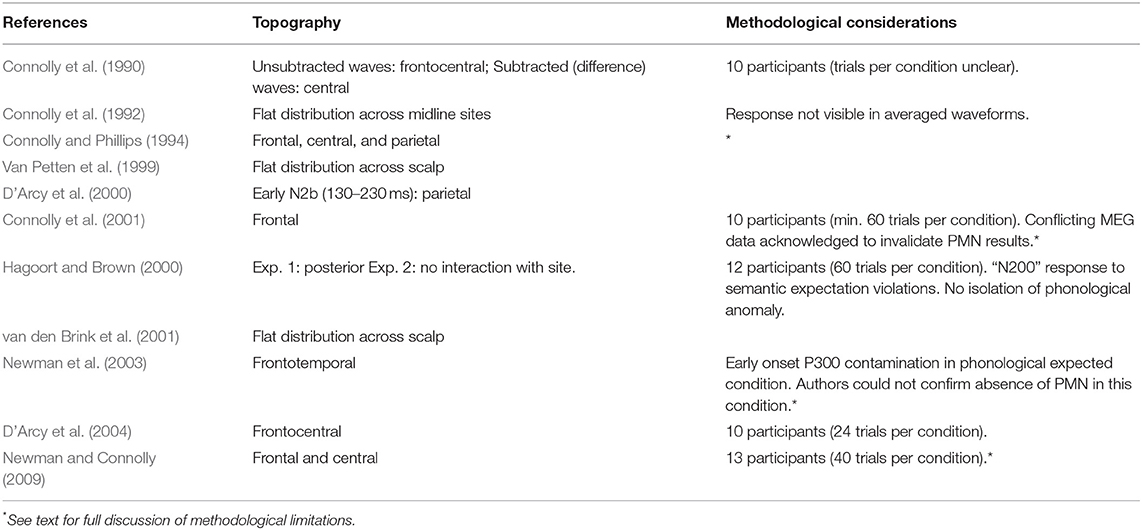- 1School of Languages, Literatures and Linguistics, Prifysgol Bangor University, Bangor, United Kingdom
- 2School of Psychology, Prifysgol Bangor University, Bangor, United Kingdom
- 3Department of Experimental Psychology, University of Oxford, Oxford, United Kingdom
A Corrigendum on
The Phonological Mapping (Mismatch) Negativity: History, Inconsistency, and Future Direction
by Lewendon, J., Mortimore, L., and Egan, C. (2020). Front. Psychol. 11:1967. doi: 10.3389/fpsyg.2020.01967
In the original article, there were the following mistakes in Table 1 as published:
• Row 2, column 2. “substraced” replaced with “subtracted.”
• Row 4, column 3. Information about incorrect study. Information deleted.
• Row 5. Column 2. “midline” amended to “scalp”
• Row 6. Column 2. “Late N2b (250–350 ms): distributed across scalp” deleted – irrelevant.
• Row 7: Column 2. Updated to reflect the dual-study results.

Table 1. Summary of key studies charaterizing the PMN, reported effect topographies and methodological considerations.
The corrected Table 1 appears below.
Corrections have also been made to the title and keywords of the original article.
The corrected title and keywords are shown below:
Title: The Phonological Mapping (Mismatch) Negativity: History, Inconsistency, and Future Direction.
keywords: event-related potentials, phonology, PMN, N400, MMN, phonological mismatch, phonological mapping, language.
The authors apologize for these errors and state that they do not change the scientific conclusions of the article in any way. The original article has been updated.
References
Connolly, J. F., and Phillips, N. A. (1994). Event-related potential components reflect phonological and semantic processing of the terminal word of spoken sentences. J. Cogn. Neurosci. 6, 256–266. doi: 10.1162/jocn.1994.6.3.256
Connolly, J. F., Phillips, N. A., Stewart, S. H., and Brake, W. G. (1992). Event-related potential sensitivity to acoustic and semantic properties of terminal words in sentences. Brain Lang. 43, 1–18. doi: 10.1016/0093-934X(92)90018-A
Connolly, J. F., Service, E., D'Arcy, R. C. N., Kujala, A., and Alho, K. (2001). Phonological aspects of word recognition as revealed by high-resolution spatio-temporal brain mapping. NeuroReport 12, 237–243. doi: 10.1097/00001756-200102120-00012
Connolly, J. F., Stewart, S. H., and Phillips, N. A. (1990). The effects of processing requirements on neurophysiological responses to spoken sentences. Brain Lang. 39, 302–318. doi: 10.1016/0093-934X(90)90016-A
D'Arcy, R. C. N., Connolly, J. F., and Crocker, S. F. (2000). Latency shifts in the N2b component track phonological deviations in spoken words. Clin. Neurophysiol. 111, 40–44. doi: 10.1016/S1388-2457(99)00210-2
D'Arcy, R. C. N., Connolly, J. F., Service, E., Hawco, C. S., and Houlihan, M. E. (2004). Separating phonological and semantic processing in auditory sentence processing: a high-resolution event-related brain potential study. Hum. Brain Mapp. 22, 40–51. doi: 10.1002/hbm.20008
Hagoort, P., and Brown, C. M. (2000). ERP effects of listening to speech: semantic ERP effects. Neuropsychologia 38, 1518–1530. doi: 10.1016/S0028-3932(00)00052-X
Newman, R. L., and Connolly, J. F. (2009). Electrophysiological markers of pre-lexical speech processing: Evidence for bottom–up and top–down effects on spoken word processing. Biol. Psychol. 80, 114–121. doi: 10.1016/j.biopsycho.2008.04.008
Newman, R. L., Connolly, J. F., Service, E., and Mcivor, K. (2003). Influence of phonological expectations during a phoneme deletion task: evidence from event-related brain potentials. Psychophysiology 40, 640–647. doi: 10.1111/1469-8986.00065
van den Brink, D., Brown, C. M., and Hagoort, P. (2001). Electrophysiological evidence for early contextual influences during spoken-word recognition: N200 versus N400 effects. J. Cogn. Neurosci. 13, 967–985. doi: 10.1162/089892901753165872
Keywords: event-related potentials, phonology, PMN, N400, MMN, phonological mismatch, phonological mapping, language
Citation: Lewendon J, Mortimore L and Egan C (2021) Corrigendum: The Phonological Mapping (Mismatch) Negativity: History, Inconsistency, and Future Direction. Front. Psychol. 11:619241. doi: 10.3389/fpsyg.2020.619241
Received: 19 October 2020; Accepted: 15 December 2020;
Published: 28 January 2021.
Edited and reviewed by: Valentina Cuccio, University of Messina, Italy
Copyright © 2021 Lewendon, Mortimore and Egan. This is an open-access article distributed under the terms of the Creative Commons Attribution License (CC BY). The use, distribution or reproduction in other forums is permitted, provided the original author(s) and the copyright owner(s) are credited and that the original publication in this journal is cited, in accordance with accepted academic practice. No use, distribution or reproduction is permitted which does not comply with these terms.
*Correspondence: Jennifer Lewendon, ai5sZXdlbmRvbkBiYW5nb3IuYWMudWs=
 Jennifer Lewendon
Jennifer Lewendon Laurie Mortimore2
Laurie Mortimore2